When Nahid Persson Sarvestani was a little girl in Iran in the ’70s, she adored the glamorous Queen Farah. The queen’s fairytale life of parties and palaces was much different from her own: Her father was ill, and her mother wove carpets 15 hours a day to support their family of 10. But as she got older, Sarvestani began to see the injustice of the monarchy and joined the secular resistance. Her 17-year-old brother was executed by the Islamic government just after the shah’s regime collapsed. Twenty-nine years after the revolution, Sarvestani started making a film about her former idol and enemy, now living in exile in Paris. The result is a frank portrait of a charismatic woman who doesn’t fully understand her role in her country’s history.
At first, Farah, now 71, balks at the prospect of having her personal life exposed—and even after she agrees to the film, she struggles to preserve her dignity. “I have an image to maintain,” she sniffs when Sarvestani tries to accompany her into a hair salon. When Farah discovers that Sarvestani was involved in the resistance, she threatens to pull out of the film, changing her mind only after Sarvestani convinces her that many Iranians—including herself—still see her as a compassionate person.
Farah does come across as kind yet genuinely naive. She says she wishes she could have done more for her subjects, telling Sarvestani, “You should have written to us, ‘My mother is struggling to feed eight children; do something for us.'” When Sarvestani finally confronts Farah about the executions under the shah’s regime, the queen responds simply, “The shah wouldn’t personally do it.” Cold comfort for the survivors, and a telling insight into the blinding power of privilege.


















